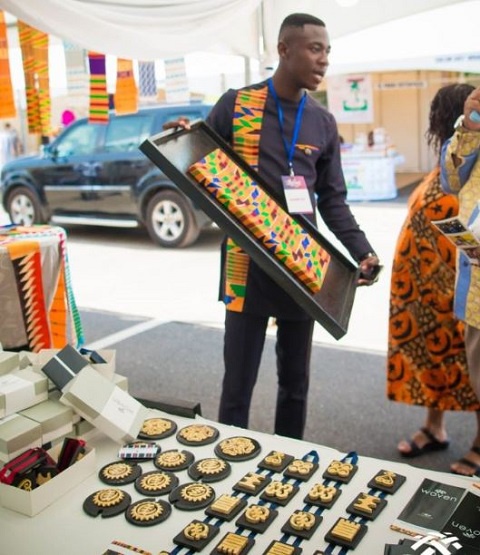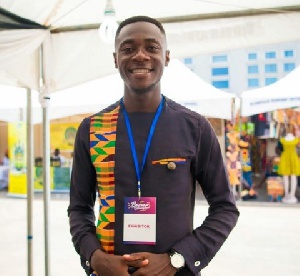Kente is a traditionally woven colourful cloth that is usually worn on special occasions.
Get it as gift for that special person and he or she will forever remember the gesture. Because of its invaluable nature, getting the original is paramount to anyone who buys it.
There is one young man – Benjamin Owusu, CEO of Woven Africa – who is using a website to make this an easy task.
Read on as he shares with the B&FT’s Inspiring Startups how he is using his newly-created website to project authentic Ghanaian Kente to the rest of the world.
Benjamin Epton Owusu was born in Kumasi but has lived in the capital, Accra, all his life. He studied Business Administration at Ashesi University in Accra. After graduating, he worked with an Accra-based radio station for national service and later had a job with an investment company.
While working for the investment company, it dawned on him why he was helping other businesses with the knowledge he had acquired from school but could not use it to set up and grow his own. Then he recalled that his mother was in the business of selling Kente, but age was fast catching up with her so she could no longer exert herself that much.
Having no one to take care of his mother’s business, he resigned from the investment company to take charge of it by himself. He put together a business plan and started thinking about what to do to make the Kente more marketable.
The Kente stoles
Benjamin realised a growing trend in America and Europe that wasn’t common in Ghana. That trend was the use of graduation stoles by many universities across the aforementioned continents. This prompted him that it could be a good business idea to use the Kente cloth to make stoles for students in Ghana during their graduation.
He outlined a number of universities and pitched the idea to them, and to his surprise all those universities bought into the idea.
Currently, he supplies Kente stoles to eight universities in Ghana and two other universities outside the country, which include the famous Harvard University in the United States.
He has also added the production of ‘adinkra’ symbols to complement the Kente stoles.
Seeing the interest some schools showed when he pitched the Kente stoles idea to them, he decided to spread his tentacles to the main Kente fabric. This birthed the idea of a new website—wovenafrica.com
The WovenAfrica.com
There are many in the diaspora who like the Kente cloth and always ask Ghanaians coming home for holidays to get them the original. Once again, Benjamin saw a business opportunity in that. He thought about making it easy for people to be able to have easy access to the Kente cloth at their convenience and at the right price. To achieve this, he has set up a website called wovenafrica.com which has provided a platform for buyers to link directly with weavers.
What is unique about the website is that buyers can get the cloth directly from the weavers wherever they find themselves in the world. The cloth can be shipped to the buyer through EMS and delivered in just five days.
Through this medium, buyers are confident and assured of quality and original Kente cloth, compared to going through a third party which may not guarantee that.
“What we are doing with the website is that we are trying to push the Kente cloth to the diaspora at the same price that they would get it when they bought directly from the weavers.”

Vision
The vision of Wovenafrica.com is to send Ghana as far as possible using the traditional Kente cloth.
How education has helped
As someone who has a degree in Business Administration, there is no doubt his education has had a profoundly satisfying effect on his business
He said: “My educational background has helped me a lot. It has taught me how to market my product, how to position my business, how to add value to my brand, and how to keep my books”.
Challenges
The first challenge Benjamin encountered and which became a source of frustration to him when he started this business was the attitude of artisans.
“When I started this business, I had a tough time with the artisans. They don’t like to be told how you want your product. They want to produce what they know and just give to you. Sometimes they openly told me I am a small boy and I don’t have any experience in the business, so I should just allow them to do as they want.”
Financial constraints also cannot be left out of the challenges. As earlier stated, his passion to take over his ageing mother’s business made him resign from his previous employment when he had saved only GH?3,000. So, he had to constantly rely on retained earnings as capital for his business.
Again considered a challenge, is the mindset of Ghanaians that everything produced in Ghana must be sold cheap. Benjamin says that attitude is stifling the growth of local industries as they are unable to make gains that will sustain their business.
How can government support local industries?
“All we want from government is that it should create an enabling environment for businesses to thrive. It should make sure that the economy is strong enough to support businesses. When the business environment is good, we can raise money to grow our business.”
Advice to budding entrepreneurs
“I would encourage young entrepreneurs to believe in themselves; believe in their potential, and fight hard. As an entrepreneur, you need the fighting spirit. Once you have these qualities, you can overcome all the challenges you face in your business.”
Business News of Thursday, 31 May 2018
Source: thebftonline.com













